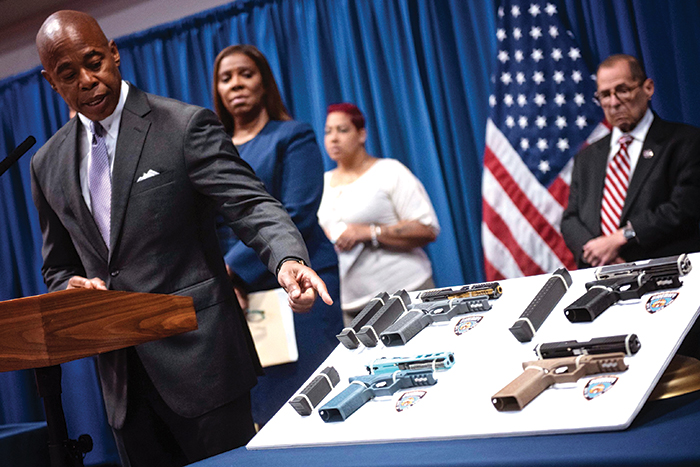Photo Courtesy of Michael Appleton/Mayoral Photography Office
“The Concealed Carry Improvement Act and the State’s nuisance statutes are both critical to damming the rivers feeding the sea of gun violence and keeping us all safe,” Mayor Adams said.
By Forum Staff
The City Department of Law this week has filed two amicus briefs with the U.S. Court of Appeals for the Second Circuit in support of New York state’s legal fight against gun violence in two cases — Antonyuk v. Hochul and National Shooting Sports Foundation, Inc. v. James (NSSF v. James) — that seek to invalidate common sense gun laws that protect the public. One amicus brief — in the case Antonyuk v. Hochul — argues for the reversal of a court ruling blocking provisions of the Concealed Carry Improvement Act (CCIA) that prohibits guns in sensitive locations and sets new gun-licensing requirements for concealed carry permits. A separate amicus brief — in the case NSSF v. James — argues in support of a lower court ruling upholding a state “nuisance” statute, which was used by New York City to stop retailers from illegally selling ghost guns and the kits used to make them to city residents.
The CCIA was enacted following a U.S. Supreme Court ruling last year in New York State Rifle & Pistol Association Inc. v. Bruen, which ruled that a state law requiring proper cause to carry a concealed weapon in New York State was unconstitutional. The plaintiffs obtained a court ruling blocking certain pieces of the CCIA’s “sensitive location” restrictions and licensure requirements, which the Second Circuit has stayed pending State Attorney General Tish James’s appeal.
In the Antonyuk v. Hochul amicus brief, the City supports the appeal filed by James, arguing that the district court erred in its ruling because it ignored a long tradition of local regulations of firearms, which existed since the state’s founding. The brief argues that these regulations provide strong evidence that the original public understanding of the right to bear arms tolerated appropriate limitations in certain sensitive locations, similar to the sensitive location provisions in the CCIA. The brief also makes the case that the CCIA’s good-moral-character licensure standard, and attendant disclosures required of license applicants, were fully consistent with the recent Supreme Court ruling in Bruen because they work to ensure that only law-abiding citizens are authorized to carry firearms.
In the NSSF v. James amicus brief, the state’s largest cities — New York City, Buffalo, Rochester, and Syracuse — join forces to support New York State in its defense of a state law allowing cities and private individuals to sue a member of the gun industry for unlawful or unreasonable business practices that cause harm in the state. Last year, the City sued five online ghost-gun retailers under this “nuisance law” to stop the companies from illegally selling these guns and the kits to make them to New Yorkers. To date, the City has negotiated agreements with four companies and obtained a preliminary injunction against the fifth to stop the illegal sale of these ghost guns and kits.
“The Concealed Carry Improvement Act and the State’s nuisance statutes are both critical to damming the rivers feeding the sea of gun violence and keeping us all safe,” Adams said.
The amicus brief supports James — who is defending the law in a challenge brought by the gun industry — arguing that a lower court was correct in holding that the statute is consistent with federal law and constitutional. The brief states that, on average, in New York State, 870 people die and thousands more are wounded every year from gun violence, and the law helps cities target the sources of illegal firearms. Improving even a single gun dealer’s sales practices can materially reduce the availability of illegal weapons in an entire community, according to the brief.

